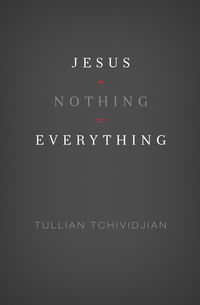One of my favorite things about Christmas break is the opportunity to read. As a principal and a student, there are very few times during the year when both of my schools are on break. When they are both on break, I really try to have a plan to intentionally invest in my heart and mind. I have been hearing a lot about Tullian Tchividjian‘s book Jesus+Nothing=Everything for quite some time. I ordered it a few weeks ago and have been excited to dig in to it.
Pastor Tullian‘s authenticity in sharing his own struggles and turmoil made this book something that was both safe and challenging to dive in to. I constantly have to be reminded that Christ’s perfect work on the cross for me paid the price for me. There is nothing more or nothing less that I could do to earn God’s approval or the approval of the temporal people on this planet. Too often I am guilty of believing the lie that I have to be “more” in order to please “them”. That is a vain and fruitless pursuit that only leads me further away from who Christ created me to be in Him.
I highlighted several things while reading and I hope they might prove to be helpful to you. I would really encourage you to pick up a copy of this book and really meditate on what it means to live for the audience of Christ alone. Below I have posted what I highlighted while reading…
- God does everything through people who understand they’re nothing. And God does nothing through those who think they’re everything.
- I was learning the hard way that the gospel alone can free us from our addiction to being liked—that Jesus measured up for us so that we wouldn’t have to live under the enslaving pressure of measuring up for others.
- Rediscovering the gospel enabled me to see that:
Because Jesus was strong for me, I was free to be weak;
Because Jesus won for me, I was free to lose;
Because Jesus was someone, I was free to be no one;
Because Jesus was extraordinary, I was free to be ordinary;
Because Jesus succeeded for me, I was free to fail.
- The everything we crave is so vast, so comprehensive, so deep, so high, that it extends even this far—to God himself.
- Whatever deficiency lies at the deepest root of our restlessness—no matter how big or small, whether it’s life-gripping or comparatively trivial—the missing component is something very specific that Christ has already secured for restless sinners like you and me.
- As Martin Luther once said, “Whatever your heart clings to and confides in, that is really your God”—your functional savior.
- Legalism happens when what we need to do, not what Jesus has already done, becomes the end game.
- Examine yourself. Dissect your heart. Recognize reality.
- Jesus plus nothing equals everything—and everything minus Jesus equals nothing.
- Jesus owns the concept of “everything.”
- This greatness of God in the person of Christ is why Paul can say that “all the promises of God find their Yes in him”—in Christ (2 Corinthians 1:20).
- With every new perception of Christ’s fullness that we receive, we open ourselves up to be blessed with even more, as Jesus himself testifies: “For to the one who has, more will be given and he will have an abundance” (Matthew 13:12).
- Colossians 1:12: “The Father…has qualified you to share in the inheritance of the saints in light.”
- Because of Christ’s finished work, Christians already possess the approval, the love, the security, the freedom, the meaning, the purpose, the protection, the new beginning, the cleansing, the forgiveness, the righteousness, and the rescue we intensely long for and, in fact, look for in a thousand things smaller than Jesus every day—things transient, things incapable of delivering the goods.
- Santicification is the daily hard work of going back to the reality of our justification.
- God hates legalism because it’s our attempt to stand on our own righteousness in outright disrespect and disregard and misunderstanding of God’s righteousness.
- Expanding on a famous line from William Temple in the nineteenth century, I like to remind myself and others that the only thing you contribute to your salvation and to your sanctification is the sin that makes them necessary.
- Reigning eternally, Jesus alone possesses the eternal resources we need to satisfy our eternal yearnings. That’s why looking to anything or anyone smaller than Jesus to save us is an exercise in futility.
- Is there a gospel-soaked attractiveness to our lives? Does an aroma of grace spill out from us into selfless service to others?
- The gospel frees us from this pressure to perform, this slavish demand to “become.” The gospel liberatingly declares that in Christ “we already are.”
- The Spirit’s continuing subjective work in me consists of his constant, daily driving me back to Christ’s completed objective work for me.
- We have to keep reminding ourselves of the difference between moralism and the gospel. W e have to keep remembering that the reason Christ came was first of all not to make bad people good but to make dead people alive. If we forget that, our Christianity will turn out to be Christless.
- The gospel’s secret of maturity is this: we become more spiritually mature when we focus less on what we need to do for God and focus more on all that God has already done for us.
- The gospel of Christ gives us the freedom that the law never could.
- “I consider that the sufferings of this present time are not worth comparing with the glory that is to be revealed to us” (Romans 8:18).

